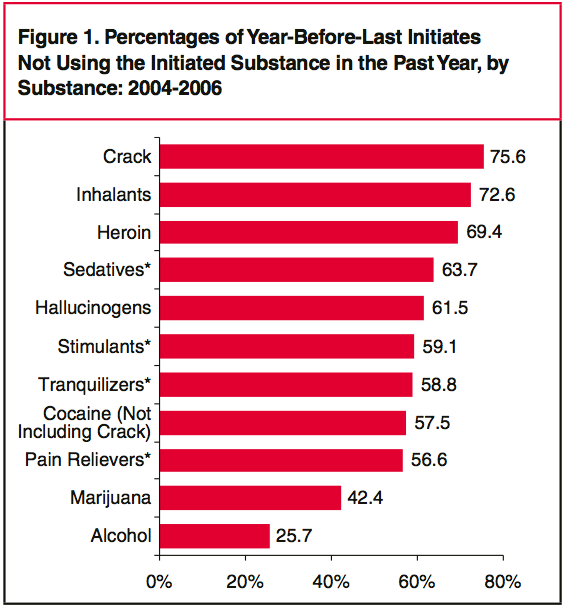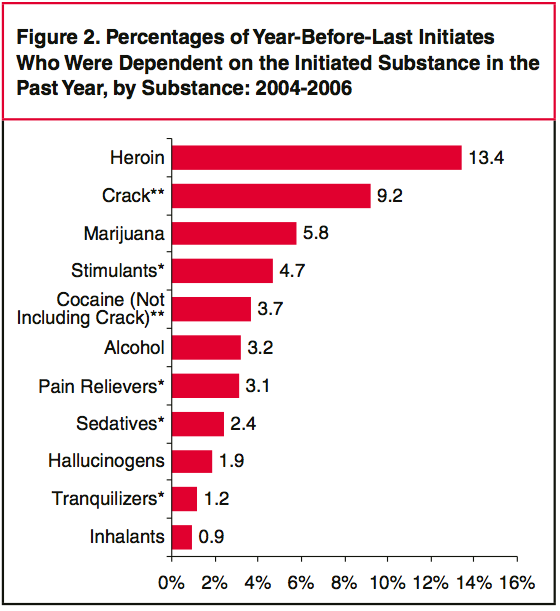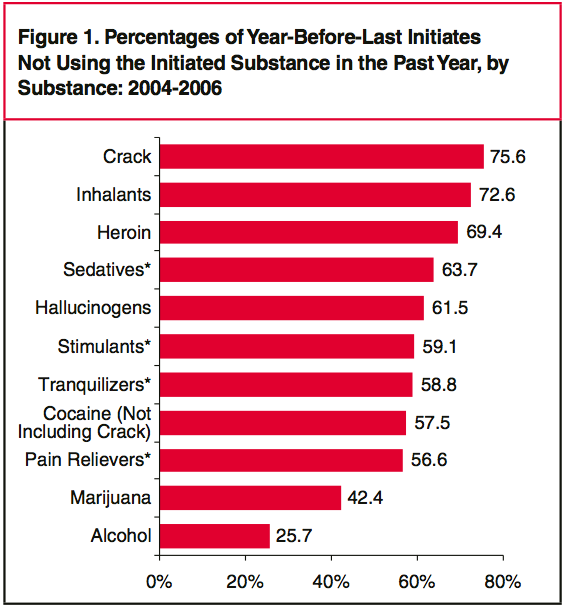It’s easy to jump to conclusions when we hear that someone has used drugs. Many of us instantly fear the worst, and assume them to be “addicted”, for no reason other than that they’ve used drugs, and that we’ve been taught that most drugs are so dangerous that they instantly take hold of the user and turn them into an addict. In particular, crack, heroin, and meth (stimulants) have this reputation. As of late, pain relievers such as oxycontin have been added to this list of drugs that are so dangerous that there is an epidemic of people becoming addicts when they were just using them innocently to relieve pain. I’m here to say that it’s a lot of hype we’ve been fed, and we shouldn’t be so quick to assume that someone has succumbed to addiction.
Addiction is known clinically as “Substance Dependence”, and it is diagnosed by referring to what is basically a checklist in the APAs Diagnostic and Statistical Manual. The checklist involves criteria such as experiencing health, legal, and emotional problems as a result of use, making unsuccessful attempts to stop or cut down use, as well as experiencing tolerance and withdrawal, among other things. Check off enough of these things and you fit the diagnosis of an addict. A 2008 study asked people aged 12 and older, who had just started using different drugs over the past 2 years, how much they had used these drugs in the past year. They also asked them questions to determine whether they fit the diagnosis of “substance dependent”. The results as you will see, are that not only do most people not become instantly addicted, most don’t even continue to use the drug in question.
The following chart shows the results of how many people started using a particular drug 13-24 months ago, but haven’t used it in the past 12 months:
 So, when it comes to crack, 75% of people who tried it 1-2 years ago, haven’t used it in the past year, 69% of those who tried heroin haven’t used it in the past year, 59% of those who tried stimulants haven’t used them in the past year, and 56% of those who tried pain relievers such as oxycontin haven’t used them in the past year. So much for these drugs being “instantly addictive”.
So, when it comes to crack, 75% of people who tried it 1-2 years ago, haven’t used it in the past year, 69% of those who tried heroin haven’t used it in the past year, 59% of those who tried stimulants haven’t used them in the past year, and 56% of those who tried pain relievers such as oxycontin haven’t used them in the past year. So much for these drugs being “instantly addictive”.
The problem is that those of us on the outside who buy into the prejudicial hype which automatically assumes anyone who touches, say heroin, to be a lying addict, will be quick to send people who might only be experimenting or casually using a drug, off to a treatment program. And those people working in the treatment program will be quick to give our loved one a life sentence of addiction, brainwashing them into believing that they are genetically flawed, diseased, “powerless”, and incapable of choosing whether or not to use drugs. They’ll be taught that they can never even drink at a safe and socially acceptable level. They’ll be given a peer group of substance abusers from whom they’ll learn new tricks and come to see addiction and impulsivity as normal modes of behavior. This is especially a danger for young people, who may experiment, and most of whom will quickly move on from drugs – but they can only do that if we allow them to take their natural course with it. Furthermore, it’s not only parents and family members who will doom someone to the fate of a lifelong addict, it’s also school administrators and judges who will take an experimenter and teach them to be an addict. So it would do us all well to be aware of the reality rather than the hype about substance use patterns.
Only a small number of recent initiates to drug use actually go on to display the symptoms of dependence (addiction), as the following graph shows:
 That’s how many people become addicted. The numbers are surprisingly low, aren’t they? What’s more interesting is that there is a gap. If you look at both charts you’ll see that 13.4% become heroin dependent, and 69.4% have been abstinent of the drug for the past year – that leaves 17.2% of people who tried heroin, didn’t become dependent, but have used the drug non-dependently. When you work with addicts you don’t usually see these people, so it’s easy to assume that they don’t exist, but they do exist. Some of them may go on to addiction, some may continue to use moderately, and some may simply lose interest . It’s important to realize we shouldn’t paint them with a broad brush. Addiction isn’t so clear cut that we can say that drugs instantly take over people’s lives, and we can’t assume that it’s one way or the other and that we can determine from the outside whether someone is addicted or not – nor is such an approach really helpful. More realistically, addiction should be measured personally, by the substance user, they should be allowed to consider how the drug use fits into their life and whether or not it adds or detracts from their overall life experience. Can we talk to those we love and wish to help on that level? If we did that, rather than jumping to conclusions and making their decisions for them, then we would probably get better results. Instead, our culture is combative with substance users, and they only end up fighting with us for independence of mind (a state in which further drug use/abuse is an expression of stifled will), or they accept our death sentence of a lifelong struggle with addiction, and live up to our expectations.
That’s how many people become addicted. The numbers are surprisingly low, aren’t they? What’s more interesting is that there is a gap. If you look at both charts you’ll see that 13.4% become heroin dependent, and 69.4% have been abstinent of the drug for the past year – that leaves 17.2% of people who tried heroin, didn’t become dependent, but have used the drug non-dependently. When you work with addicts you don’t usually see these people, so it’s easy to assume that they don’t exist, but they do exist. Some of them may go on to addiction, some may continue to use moderately, and some may simply lose interest . It’s important to realize we shouldn’t paint them with a broad brush. Addiction isn’t so clear cut that we can say that drugs instantly take over people’s lives, and we can’t assume that it’s one way or the other and that we can determine from the outside whether someone is addicted or not – nor is such an approach really helpful. More realistically, addiction should be measured personally, by the substance user, they should be allowed to consider how the drug use fits into their life and whether or not it adds or detracts from their overall life experience. Can we talk to those we love and wish to help on that level? If we did that, rather than jumping to conclusions and making their decisions for them, then we would probably get better results. Instead, our culture is combative with substance users, and they only end up fighting with us for independence of mind (a state in which further drug use/abuse is an expression of stifled will), or they accept our death sentence of a lifelong struggle with addiction, and live up to our expectations.
SOURCE:
Substance Abuse and Mental Health Services Administration, Office of Applied Studies. (March 27, 2008). The NSDUH Report: Substance Use and Dependence Following Initiation of Alcohol or Illicit Drug Use. Rockville, MD.

This is by far your best article yet! The statistics are very telling. There is no greater tragedy for young people today than being relegated to a lifetime of needless struggle, senseless meetings and therapy!
Another negative result of the irrational claim that all drugs are instantly addictive and cause people to develop irrevocably antisocial behaviors [dishonesty, stealing and work-shirking] is the undertreatment of pain. Even doctors who are aware that pain treatment doesn’t create these negative behaviors in law-abiding people with chronic pain are hesitant to take on pain patients for fear that the doctor will be judged to have overprescribed pain meds regardless of the good functioning of the person who requires large doses of painkillers, espscially for long-term or incurable painful conditions. Many nurses believe the hype about addiction, and even though scientific evidence shows that regularly-scheduled consumption of opiates results in better pain control and ultimately lower doses of opiates to control pain, nurses will intentionally drag their feet when doctors order regularly-scheduled pain meds, and proudly announce to the patient that it’s “great you went X number of extra minutes” past the scheduled time for their medication. Also, there are people with legitimate, painful conditions who are afraid of pain controlling drugs because they fear using opiate drugs causes people to acquire the negative personality and behaviorial traits that addiction theory has taught the American public to associate with drug use.
I fear that people with chronic & painful conditions may end up being smeared with the same stigma that is associated with “addict” because if it’s the drug that instills the antisocial phenomenon that is understood by Americans as “addiction” – how can one group exposed to the exact same drugs as the other expect us to believe these drugs won’t cause them to become permanently damaged in the exact same way? I also think the fact that chronic pain patients have been demonstrated to not develop the negative attributes associated with “addiction” suggests that it’s not the drugs that cause the objectionable behavior [dishonesty, stealing, work-shirking], but selfish choices.
And here’s a bit of addiction ridiculousness from a dentist’s office in my area: patients who choose nitrious oxide during serious procedures such as root canal or wisdom tooth extraction are forced to sign a paper acknowledging the risk that recieving nitrious oxide during a dental procedure may trigger the development of drug addiction. I’d love to see the double-blind, peer reviewed data on that claim…
Thanks Trish.
I agree. The hype about prescription drugs is hitting insane levels, and it really won’t do anyone any good. It’ll just create another self-fulfilling prophecy where people will actually acquire a problem because they believe it’s inevitable. The disease mindset is really destroying our culture.
-Steven
Ah yes, I could tell you all about that time 10 years ago, when I told my “friends” that I had tried heroin a few times.
The reaction was actually one of the things that got me to explore drug mythology. Eventually, I discovered the problem was actually much more fundamental than I’d thought.